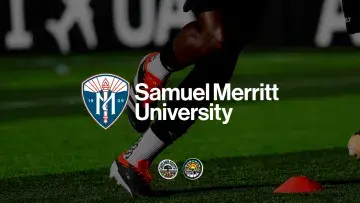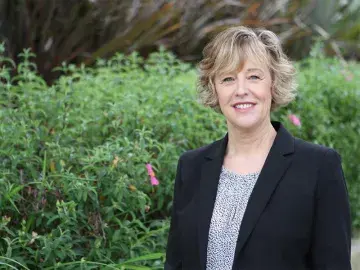Olympic Swimmer & Diabetes Advocate to Inspire Graduates
After Olympic swimmer Gary Hall Jr. learned he was diabetic, doctors told him he’d never compete again.
Hall was in prime athletic condition after winning two gold medals at the 1996 Olympic Games in Atlanta and was preparing for the next Summer Games when the diagnosis of Type 1, or insulin-dependent, diabetes threatened to end his swimming career.
“The doctors were pushing me to wear a pump,” Hall recalled. “But what I needed was a healthcare provider who could empower me, help me manage my diabetes, and keep me doing what I loved, which was swim at an elite level.”
Hall found that ally in a family nurse practitioner who encouraged him to experiment with his diet to locate the sweet spot where he could train vigorously while maintaining steady blood sugar levels. He sought out sports and medical specialists who helped him return to top form.
“I have a sincere and profound appreciation for healthcare providers,” Hall said. “It’s a commendable and valuable profession, and one that I owe my life to.”
Hall will carry that gratitude with him when he addresses graduates as the keynote speaker at SMU’s Commencement in Oakland on Friday, May 26.
Hall is a tireless advocate for diabetes research and youth sports programs in underserved communities. As the descendant of three generations of doctors, Hall has always had a strong connection to healthcare providers. While he found his passion in the swimming pool at a young age, he was surrounded by discussions about improving the health and wellness of others.
“And I also heard a lot of the frustrations with the healthcare system growing up,” Hall said. “It was clear that it wasn’t always a system where the patients were getting the best possible care they could get, nor were they always at the center of the most important decisions.”
Hall got a deeper sense for that dynamic after his diagnosis in March 1999, as he prepared for the 2000 Olympic Games in Sydney. Hall’s training was slowed by constant dehydration and fatigue. Then, a dramatic 20-pound weight loss.
Once doctors discovered the culprit, the suggested treatment seemed cruel: Wear an insulin pump and stop strenuous exercise.
“I wasn’t going to let it end like that,” Hall said.
Instead, he found a cast of supportive providers who worked with him to meticulously monitor his calorie and carbohydrate intake and then chart his performance progress.
Once Hall discovered the proper diet for non-racing days and competitions, his swimming improved. He qualified for the 2000 Games, where he won two more gold medals, a silver, and a bronze. And then he struck gold again four years later in Athens.
“Our graduates can take away an important message from Gary,” said Tim Dutra, assistant professor at SMU’s California School of Podiatric Medicine. “To treat each patient individually and develop goals that they can accomplish, for their accomplishments can surprise you. Gary’s story can serve as an inspiration for all. Diabetes affects many, and with a great medical team to support and work with patients, they can exceed all expectations.”
Hall has aimed his post-Olympic energy at promoting diabetes awareness and youth sports programs. He’s the executive director of the Santa Ynez Valley Community Aquatics Foundation, a nonprofit that is raising money to build an Olympic-sized pool and community facility in a rural community. He’s also a board member of the National Youth Sports Health & Safety Institute, and sits on a number of diabetes and health advisory boards.
“Samuel Merritt University graduates are going to be on the frontlines of our healthcare system,” Hall said. “I’m a patient advocate and I hope they’ll dedicate themselves to the personal touch, both the physical but also the psychological aspect of caring for others.
It’s important that they teach their patients how to be empowered, just as I was.”


